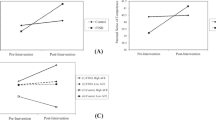Abstract
Young children from low-SES backgrounds are at higher risk for delayed language development, likely due to differences in their home language environment and decreased opportunities for back and forth communicative exchange. Intervention strategies that encourage reciprocal caregiver-child interactions may effectively promote young children’s language development and enhance optimal language outcomes. The Filming Interactions to Nurture Development (FIND) program is a brief strength-based video-coaching intervention designed to promote increased back and forth (“serve and return”) interactions between caregivers and their children. The current study used data from a randomized controlled trial (RCT) to examine the effectiveness of the FIND program in improving auditory comprehension and expressive communication skills among children from low-SES backgrounds. The current study used a pretest–posttest design to evaluate intervention effects from an RCT with 91 low-SES families. Families with children aged 4 to 36 months old (41.8% female) were randomly assigned to an active control or FIND intervention group. Children’s auditory comprehension and expressive communication were assessed using the Preschool Language Scales, Fifth Edition (PLS-5) during both pre- and post-intervention sessions. Children in the FIND intervention group showed significantly increased expressive communication skills and a non-significant increase in auditory comprehension skills across the intervention period. In contrast, children in the active control group showed non-significant changes in expressive communication and a statistically significant decline in auditory comprehension abilities between pre- and post-intervention assessments. All analyses controlled for sex, age, and home language. This study provides preliminary evidence that the FIND intervention promotes the development of expressive and receptive language skills among young children in high-stress, low-SES environments.


Similar content being viewed by others
Notes
Cortisol is another important component of this dataset but not used in the current study.
References
Aiken, L. S., West, S. G., & Reno, R. R. (1991). Multiple regression: Testing and interpreting interactions. Sage.
Baumwell, L., Tamis-LeMonda, C. S., & Bornstein, M. H. (1997). Maternal verbal sensitivity and child language comprehension. Infant Behavior and Development, 20, 247–258. https://doi.org/10.1016/S0163-6383(97)90026-6
Bratsch-Hines, M. E., Carr, R., Zgourou, E., Vernon-Feagans, L., & Willoughby, M. (2020). Infant and toddler child-care quality and stability in relation to proximal and distal academic and social outcomes. Child Development, 91, 1854–1864. https://doi.org/10.1111/cdev.13389
Chmielewski, A. K. (2019). The global increase in the socioeconomic achievement gap, 1964 20 2015. American Sociological Review, 84, 517–544. https://doi.org/10.1177/0003122419847165
Conway, L. J., Levickis, P. A., Smith, J., Mensah, F., Wake, M., & Reilly, S. (2018). Maternal communicative behaviours and interaction quality as predictors of language development: Findings from a community-based study of slow-to-talk toddlers. International Journal of Language & Communication Disorders, 53(2), 339–354. https://doi.org/10.1111/1460-6984.12352
Depaoli, S., & Clifton, J. P. (2015). A Bayesian approach to multilevel structural equation modeling with continuous and dichotomous outcomes. Structural Equation Modeling: A Multidisciplinary Journal, 22, 327–351. https://doi.org/10.1080/10705511.2014.937849
Donnelly, S., & Kidd, E. (2021). The longitudinal relationship between conversational turn-taking and vocabulary growth in early language development. Child Development, 92, 609–625. https://doi.org/10.1111/cdev.13511
Fernald, A., Marchman, V. A., & Weisleder, A. (2013). SES differences in language processing skill and vocabulary are evident at 18 months. Developmental Science, 16, 234–248. https://doi.org/10.1111/desc.12019
Fisher, P. A., Ellis, B. H., & Chamberlain, P. (1999). Early Intervention Foster Care: A model for preventing risk in young children who have been maltreated. Children’s Services: Social Policy, Research, and Practice, 2, 159–182. https://doi.org/10.1207/s15326918cs0203_3
Fisher, P. A., Frenkel, T. I., Noll, L. K., Berry, M., & Yockelson, M. (2016). Promoting healthy child development via a two-generation translational neuroscience framework: The Filming Interactions to Nurture Development video coaching program. Child Development Perspectives, 10, 251–256. https://doi.org/10.1111/cdep.12195
Gagnon, P., Desgagné, A., & Bédard, M. (2020). A new Bayesian approach to robustness against outliers in linear regression. Bayesian Analysis, 15, 389–414. https://doi.org/10.1214/19-ba1157
Gilkerson, J., Richards, J. A., Warren, S. F., Oller, D. K., Russo, R., & Vohr, B. (2018). Language experience in the second year of life and language outcomes in late childhood. Pediatrics, 142(4). https://doi.org/10.1542/peds.2017-4276
Giuliani, N. R., Beauchamp, K. G., Noll, L. K., & Fisher, P. A. (2019). A preliminary study investigating maternal neurocognitive mechanisms underlying a child-supportive parenting intervention. Frontiers in Behavioral Neuroscience, 13(16). https://doi.org/10.3389/fnbeh:2019.000016
Graham, P. W., Kim, M. M., Clinton-Sherrod, A. M., Yaros, A., Richmond, A. N., Jackson, M., & Corbie-Smith, G. (2016). Translational Behavioral Medicine, 6(1), 115–124. https://doi.org/10.1007/s13142-015-0368-2
Greenwood, C. R., Schnitz, A. G., Carta, J. J., Wallisch, A., & Irvin, D. W. (2020). A systematic review of language intervention research with low-income families: A word gap prevention perspective. Early Childhood Research Quarterly, 50, 230–245. https://doi.org/10.1016/j.ecresq.2019.04.001
Hammer, C. S., Lawrence, F. R., & Miccio, A. W. (2008). Exposure to English before and after entry to Head Start: Bilingual children’s receptive language growth in Spanish and English. International Journal of Bilingual Education and Bilingualism, 11, 30–56. https://doi.org/10.2167/beb376.0
Hart, B., & Risley, T. R. (1995). Meaningful differences in the everyday experience of young American children: Paul H. Brookes Publishing Company.
Hirsh-Pasek, K., Adamson, L. B., Bakeman, R., Owen, M. T., Golinkoff, R. M., Pace, A., & Suma, K. (2015). The contribution of early communication quality to low-income children’s language success. Psychological Science, 26, 1071–1083. https://doi.org/10.1177/0956797615581493
Hoff, E. (2003). The specificity of environmental influence: Socioeconomic status affects early vocabulary development via maternal speech. Child Development, 74, 1368–1378. https://doi.org/10.1111/1467-8624.00612
Hoff, E. (2006). How social contexts support and shape language development. Developmental Review, 26, 55–88. https://doi.org/10.1016/j.dr.2005.11.002
Hoff, E. (2013). Interpreting the early language trajectories of children from low-SES and language minority homes: Implications for closing achievement gaps. Developmental Psychology, 49, 4–14. https://doi.org/10.1037/a0027238
Hoff, E., & Naigles, L. (2002). How children use input to acquire a lexicon. Child Development, 73, 418–433. https://doi.org/10.1111/1467-8624.00415
Huttenlocher, J., Haight, W., Bryk, A., Seltzer, M., & Lyons, T. (1991). Early vocabulary growth: Relation to language input and gender. Developmental Psychology, 27, 236–248. https://doi.org/10.1037/0012-1649.27.2.236
Huttenlocher, J., Waterfall, H., Vasilyeva, M., Vevea, J., & Hedges, L. V. (2010). Sources of variability in children’s language growth. Cognitive Psychology, 61, 343–365. https://doi.org/10.1016/j.cogpsych.2010.08.002
Imhof, A., Watamura, S., Fisher, P., Moreno, A., Hurwhich-Reiss, E., Schlueter, L., Brown, S. M. (2019). Denver ACF Pre-Registration. Retrieved June 28, 2021, from osf.io/ecswy
Jaccard, J., & Turrisi, R. (2003). Interaction effects in multiple regression. Sage. https://doi.org/10.4135/9781412984522
Jonkman, C. S., Schnengel, C., Oosterman, M., Lindeboom, R., Boer, F., & Lindauer, R. J. L. (2017). Effects of Multidimensional Treatment Foster Care for Preschoolers (MTCF-P) for young foster children with severe behavioral disturbances. Journal of Child and Family Studies, 26, 1491–1503. https://doi.org/10.1007/s10826-017-0661-4
Karpman, M., Zuckerman, S., Gonzalez, D., & Kenney, G. (2020). The COVID-19 pandemic is straining families' abilities to meet basic needs. Urban Institute. Retrieved June 28, 2021, from https://www.urban.org/sites/default/files/publication/102124/the-covid-19-pandemic-is-straining-families-abilities-to-afford-basic-needs_5.pdf
Leech, K. A., & Rowe, M. L. (2021). An intervention to increase conversational turns between parents and young children. Journal of Child Language, 48(2), 399–412. https://doi.org/10.1017/S0305000920000252
Little, R. J., & Rubin, D. B. (2019). Statistical analysis with missing data (3rd ed.): John Wiley & Sons. https://doi.org/10.1002/9781119482260
Liu, S., Phu, T., Dominguez, A., Hurwich-Reiss, E., McGee, D., Watamura, S. E., & Fisher, P. A. (2021). Improving caregiver self-efficacy and children’s behavioral outcomes via a brief strength-based video coaching intervention: Results from a randomized controlled trial. Prevention Science. https://doi.org/10.1007/s11121-021-01251-6
Mahalanobis, P. C. (1936). On the generalised distance in statistics (PDF). Proceedings of the National Institute of Sciences of India, 2(1), 49–55. Retrieved 2016–09–27.
Mahr, T., & Edwards, J. (2018). Using language input and lexical processing to predict vocabulary size. Developmental Science, 21, e12685. https://doi.org/10.1111/desc.12685
Marchman, V. A., Fernald, A., & Hurtado, N. (2010). How vocabulary size in two languages relates to efficiency in spoken word recognition by young Spanish-English bilinguals. Journal of Child Langauge, 37, 817–840. https://doi.org/10.1017/S0305000909990055
Muthén, L., & Muthén, B. (2018). Mplus: The comprehensive modelling program for applied researchers (User’s Guide - 5th ed.): Muthén & Muthén.
Neville, H. J., Stevens, C., Pakulak, E., Bell, T. A., Fanning, J., Klein, S., & Isbell, E. (2013). Family-based training program improves brain function, cognition, and behavior in lower socioeconimc status preschools. Proceedings of the National Academy of Sciences of the United States of America, 110, 12138–12143. https://doi.org/10.1073/pnas.1304437110
Pace, A., Luo, R., Hirsh-Pasek, K., & Golinkoff, R. M. (2017). Identifying pathways between socioeconomic status and language development. Annual Review of Linguistics, 3, 285–308. https://doi.org/10.1146/annurev-linguistics-011516-034226
Peña, E. D., Bedore, L. M., & Kester, E. S. (2015). Discriminant accuracy of a semantics measure with Latino English-speaking, Spanish-speaking, and English-Spanish bilingual children. Journal of Communication Disorders, 53, 30–41. https://doi.org/10.1016/j.jcomdis.2014.11.001
Ranganathan, P., Pramesh, C. S., & Aggarwal, R. (2016). Common pitfalls in statistical analysis: Intention-to-treat versus per-protocol analysis. Perspectives in Clinical Research, 7, 144. https://doi.org/10.4103/2229-3485.184823
Rodriguez, E. T., & Tamis-LeMonda, C. S. (2011). Trajectories of the home learning environment across the first 5 years: Associations with children’s vocabulary and literacy skills at prekindergarten. Child Development, 82, 1058–1075. https://doi.org/10.1111/j.1467-8624.2011.01614.x
Romeo, R. R., Leonard, J. A., Robinson, S. T., West, M. R., Mackey, A. P., Rowe, M. L., & Gabrieli, J. D. (2018). Beyond the 30-million-word gap: Children’s conversational exposure is associated with language-related brain function. Psychological Science, 29(5), 700–710. https://doi.org/10.1177/0956797617742725
Romeo, R. R., Leonard, J. A., Grotzinger, H. M., Robinson, S., Takada, M., Mackey, A., & & Gabrieli, J. A. (2021). Neuroplasticity associated with changes in conversational turn-taking following a family-based intervention. Developmental Cognitive Neuroscience, 49, 1–12. https://doi.org/10.1016/j.dcn.2021.100967
Rapid Assessment of Pandemic Impact on Development - Early Childhood. (2021). On shaky ground: Unpredictability in ability to pay for basic needs affects family well-being. https://static1.squarespace.com/static/5e7cf2f62c45da32f3c6065e/t/6108337991908b2f7ca8bdef/1627927418077/Unpredictability_Factsheet_Aug2021.pdf
Rowe, M. L. (2008). Child-directed speech: Relation to socioeconomic status, knowledge of child development and child vocabulary skill. Journal of Child Language, 35, 185–205. https://doi.org/10.1017/s0305000907008343
Rowe, M. L. (2012). A longitudinal investigation of the role of quantity and quality of child-directed speech in vocabulary development. Child Development, 83, 1762–1774. https://doi.org/10.1111/j.1467-8624.2012.01805.x
Rowe, M. L., Raudenbush, S. W., & Goldin-Meadow, S. (2012). The pace of vocabulary growth helps predict later vocabulary skill. Child Development, 83, 508–525. https://doi.org/10.1111/j.1467-8624.2011.01710.x
Schindler, H. S., Fisher, P. A., & Shonkoff, J. P. (2017). From innovation to impact at scale: Lessons learned from a cluster of research–community partnerships. Child Development, 88, 1435–1446. https://doi.org/10.1111/cdev.12904
Suskind, D. L., Leffel, K. R., Graf, E., Hernandez, M. W., Gunderson, E. A., Sapolich, S. G., & Levine, S. C. (2016). A parent-directed language intervention for children of low socioeconomic status: A randomized controlled pilot study. Journal of Child Language, 43, 366–406. https://doi.org/10.1017/S0305000915000033
Tamis-LeMonda, C. S., Kuchirko, Y., & Song, L. (2014). Why is infant language learning facilitated by parental responsiveness? Current Directions in Psychological Science, 23, 121–126. https://doi.org/10.1177/0963721414522813
Weisleder, A., & Fernald, A. (2013). Talking to children matters: Early language experience strengthens processing and builds vocabulary. Psychological Science, 24, 2143–2152. https://doi.org/10.1177/0956797613488145
Zimmerman, F. J., Gilkerson, J., Richards, J. A., Christakis, D. A., Xu, D., Gray, S., & Yapanel, U. (2009). Teaching by listening: The importance of adult-child conversations to language development. Pediatrics, 124, 342–349. https://doi.org/10.1542/peds.2008-2267
Zimmerman, I., Steiner, V., & Pond, R. (2011). The Preschool Language Scale-5: Pearson.
Zimmerman, I., Steiner, V., & Pond, R. (2012). Preschool Language Scales–Fifth Edition Spanish: Pearson.
Funding
This research was supported by the Administration for Children and Families Grant No. YR0056 awarded to Sarah Enos Watamura.
Author information
Authors and Affiliations
Corresponding author
Ethics declarations
Ethics Approval
This research was approved by the Institutional Review Board (IRB) at the University of Denver. All procedures performed in this study were in accordance with the ethical standards of institutional and/or national research committee, including the 1964 Helsinki declaration and its later amendments.
Consent to Participate
All participants in this research were informed of their rights. Informed consent was obtained from all caregivers included in this study prior to any data collection.
Conflict of Interest
The authors declare no competing interests.
Additional information
Publisher's Note
Springer Nature remains neutral with regard to jurisdictional claims in published maps and institutional affiliations.
Rights and permissions
Springer Nature or its licensor (e.g. a society or other partner) holds exclusive rights to this article under a publishing agreement with the author(s) or other rightsholder(s); author self-archiving of the accepted manuscript version of this article is solely governed by the terms of such publishing agreement and applicable law.
About this article
Cite this article
Imhof, A., Liu, S., Schlueter, L. et al. Improving Children’s Expressive Language and Auditory Comprehension Through Responsive Caregiving: Evidence from a Randomized Controlled Trial of a Strength-Based Video-Coaching Intervention. Prev Sci 24, 84–93 (2023). https://doi.org/10.1007/s11121-022-01455-4
Accepted:
Published:
Issue Date:
DOI: https://doi.org/10.1007/s11121-022-01455-4




